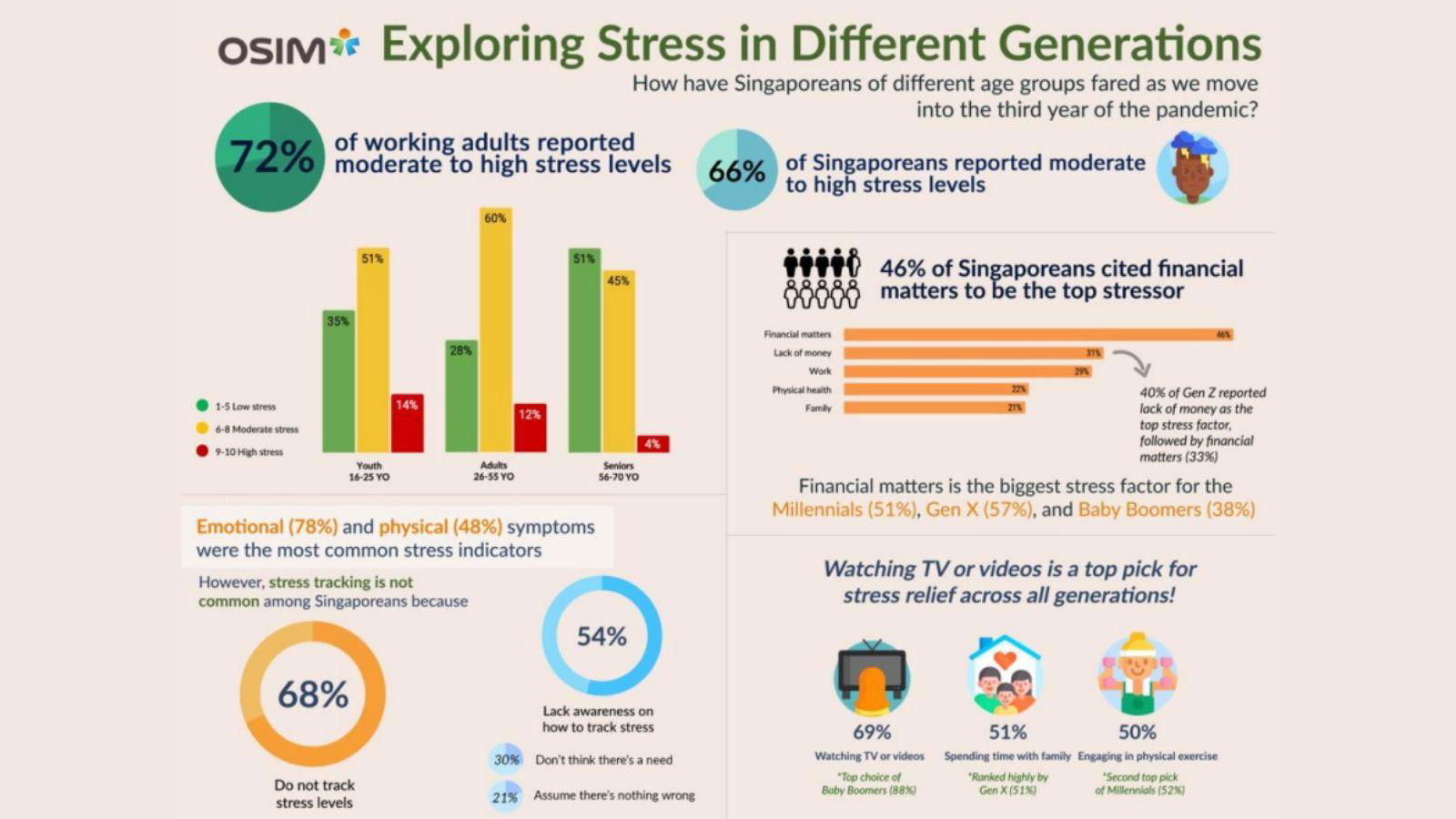share on
Working adults between the ages of 24 and 55 reported moderate to high levels of stress. Meanwhile, youths and seniors reported moderate.
Through a 2022 wellness survey, OSIM International found that a large proportion of Singaporeans experience moderate to high levels of stress - between six to 10 on a Likert scale, a rating research tool - with two in three respondents indicating so.
Of the different age groups surveyed (youth, working adults, and seniors), working adults between the ages of 24 and 55 had the highest concentration of respondents reporting moderate to high levels of stress. Six in 10 (60%) in fact indicated moderate levels of stress (six to eight on a Likert scale), and just about one in 10 (12%) indicated high stress (nine to 10). In contrast, slightly more than half (51%) of the youths, and more than four in 10 (45%) of the seniors reported moderate level of stress. Interestingly, however, there were more youth respondents who reported high levels of stress than working adults at 14%.

What causes locals to feel stress?
Data points to financial matters as the biggest source of stress across all age groups. Lack of money, work, and physical health were cited as the next few top stressors for all age groups. Based on generation demographics, the report's analysts found financial matters to be the main source of stress for Millennials (aged 26 to 41) (51%), Gen X (aged 42 to 57) (57%), and Baby Boomers (aged 57 to 75) (38%), Beyond that, local COVID-19 safe management measures (SMMs) introduced during the pandemic was indicated as the other source of stress for Singaporeans.
In specific to COVID-19 SMMs, almost two-thirds (58%) of respondents reported that such measures caused them stress. Analysts also discovered respondents were most affected by the restrictions to social and leisure activities such as dining out, house visitation limits, and overseas travel. The largest proportion of respondents felt that vaccine-related guidelines, such as entry restrictions to malls and community facilities, impacted them the most. More than a quarter (26%) of respondents ranked it as their "top stress-causing COVID-19 measure"; this is followed by restrictions on dining out (22%), and home visitation limits (18%).
Dissecting the findings into generation demographics, Gen Z considered being unable to dine out a top stressor, while Baby Boomers were the most stressed by the restrictions and limitations on visitors to households. Vaccine-related measures were the top stressor for Millennials and Gen X. Across the board, however, quarantine and recovery measures, and the reporting on infection and death rates ranked the lowest in terms of stressors.
How do locals reduce stress levels?
The survey found that the use of devices as stress relief has increased since the beginning of the pandemic more than two years ago, from 58% to 69%. "Watching TV or videos" was, according to the findings, the preferred mode of stress relief across all age groups. Translating it into numbers, more than six in 10 respondents watched TV or videos, with those aged between 56-70 years old reporting the highest figure at 88%. In younger age groups, almost half of both Gen Z, and Millennials coped with stress by using social media. That said, more than two in 10 (21%) Millennials also cited social media as a key source of stress.
Read also: How to design a beautiful workspace that maximises comfort and minimises stress
Lead image / Pexels;
Infographic: OSIM International
Follow us on Telegram and on Instagram @humanresourcesonline for all the latest HR and manpower news from around the region!
share on
Follow us on Telegram and on Instagram @humanresourcesonline for all the latest HR and manpower news from around the region!
Related topics


